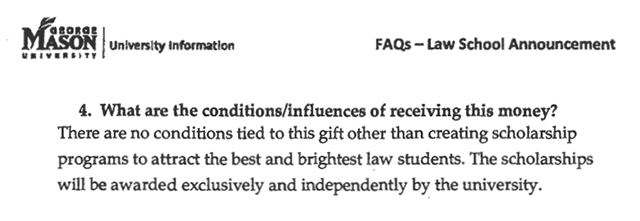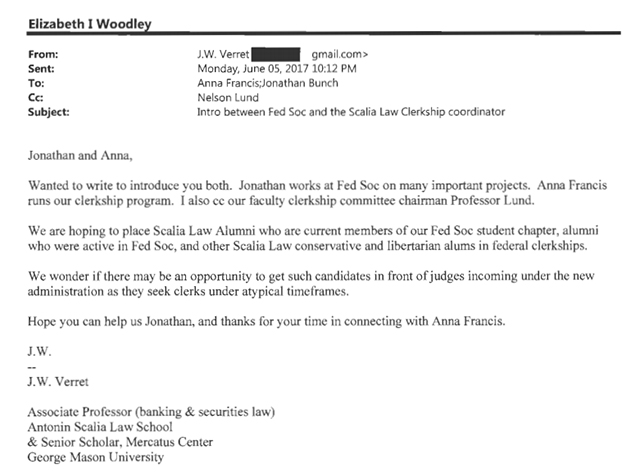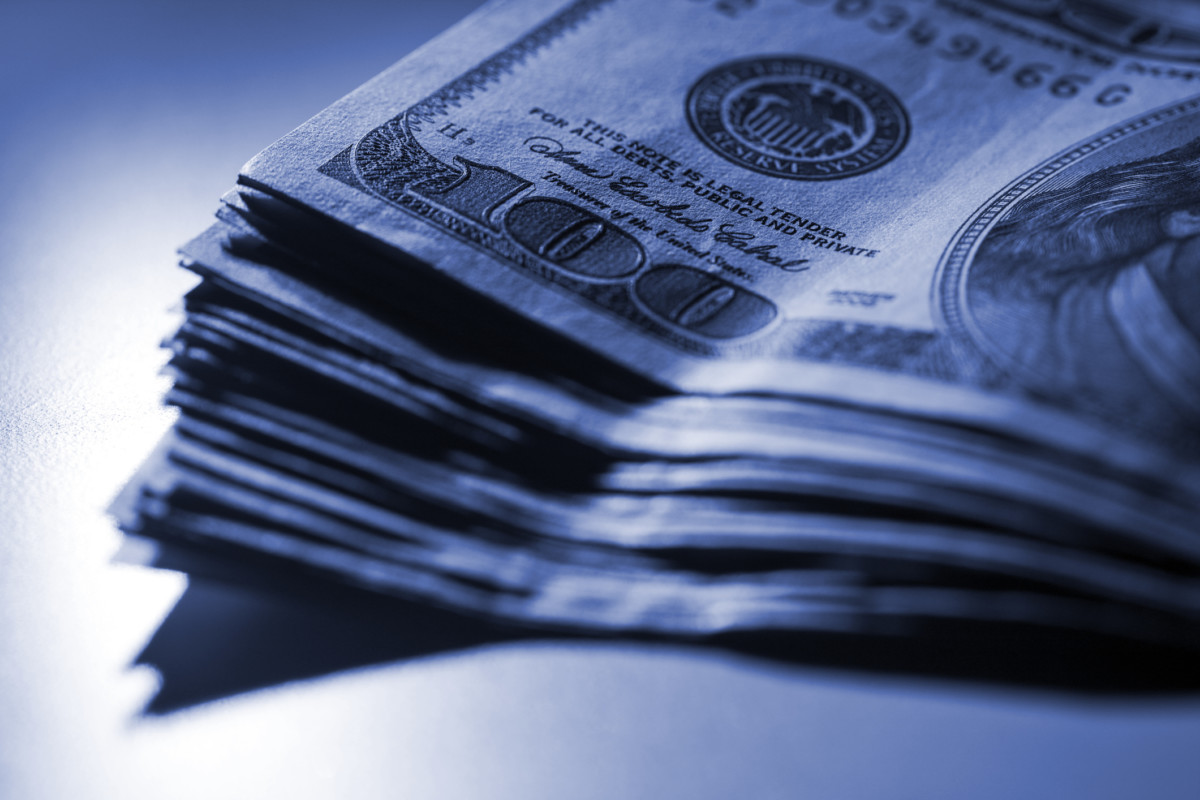A trove of emails released on Monday by the activist group UnKoch My Campus shows that leaders from a major conservative legal organization not only control a $20 million anonymous donation to the Antonin Scalia Law School at George Mason University (GMU), but also shape the hiring, admissions and academic planning at the school.
In 2016, GMU announced a $30 million donation to its law school, with $10 million from the Charles Koch Foundation (CKF) and $20 million from an anonymous donor, to fund new scholarships. The donation came with the stipulation that the law school be renamed after the late, conservative Supreme Court justice Antonin Scalia. Initially, the mystery donor was redacted from a 2016 public version of the gift agreement.
A memo sent to the university community by the law school’s dean, Henry Butler, stated, “The scholarships will be awarded exclusively and independently by the university.”

In August 2017, in response to records requests, the administrator of the mystery money was revealed to be a company called BH Fund, a “501(c)(4) Virginia nonstock corporation.” Allison Pienta, the alumna of the law school who filed for the documents, discovered that BH Fund’s president is Leonard Leo, executive vice president of the Federalist Society for Law and Public Policy Studies, a highly political organization of conservative lawyers that has dozens of university chapters and tries to impact federal judge selection. BH Fund’s secretary and treasurer is Jonathan Bunch, vice president and director of external relations at the Federalist Society. Leo and his society represent the anonymous donor and make sure the law school is adhering to that donor’s wishes.
Leo was instrumental in getting conservative and Federalist Society member Neil Gorsuch a seat on the US Supreme Court in early 2017, offering the Trump administration suggested nominees and meeting personally with the president. The society, founded in 1982, counted Scalia — a close friend of Leo’s — as its first faculty adviser. Among its top donors are Koch Industries, David Koch, the Charles Koch Foundation, Chevron, the Lynde and Harry Bradley Foundation, the Ed Uihlein Family Foundation and the US Chamber of Commerce.
In the newly released emails between Federalist Society leaders, the dean of the law school and other top officials plot out additional ways to use the donation, communicating about a “five-year plan” for the law school and candidates for new professorships, potential students and judicial clerk positions.
The documents make it clear that, through their roles at BH Fund, top Federalist Society officials are intimately involved in the inner workings of the Antonin Scalia Law School, an arrangement that appears to contradict how the agreement was presented to faculty in 2016. The arrangement also appears to contradict what George Mason University President Ángel Cabrera told the university community on Friday evening after other donor agreements involving the Charles Koch Foundation and the Mercatus Center, an on-campus, free-market think tank, were made public.
On Friday evening, just two hours before UnKoch My Campus co-founder and grassroots campaign strategist Samantha Parsons received the results of her FOIA request for private donor agreements, George Mason University president Ángel Cabrera emailed university employees to say that these new documents, which cover gift agreements initiated from 2003 to 2011, “raise questions concerning donor influence in academic matters.”
“Since I arrived at Mason in 2012, I have made it a priority to have all gift agreements clearly uphold our commitment to academic independence,” wrote Cabrera. “As I have stated before, gifts may be earmarked for programs, scholarships or faculty support, but donors may not determine what is taught, what student is funded, or what professor is hired. If these terms are not acceptable to donors, the gifts are kindly declined.”
Two years earlier, law school dean Henry Butler had sent the memo to faculty claiming that “there are no conditions tied to this gift other than creating scholarship programs.”
At a faculty senate meeting on April 6, 2016, George Mason University Provost S. David Wu told faculty and university officials that the donations came with “no strings attached, and the scholarship decisions are made by GMU. The entire $30M is for scholarships for students and nothing else.”

The emails between donors and the law school that were disclosed on Monday tell a different story. The emails, which law school alumna Allison Pienta requested and then released through UnKoch My Campus, show Leo and Butler sharing information about faculty hiring, prospective law students, judicial law clerk suggestions, allocation of the grant money and even about faculty taking leave to work in the Trump administration.
“Cabrera’s claims that this kind of influence hasn’t taken place since he became president are totally refuted by the release of these law school emails,” Parsons told Truthout. “These agreements and emails demonstrate that he has handled, and continues to handle, the operations of George Mason University with negligence.”
University spokesperson Michael Sandler responded on Tuesday to multiple questions from Truthout with much of the same language contained in Cabrera’s Monday email, saying that president “will be collaborating with faculty and working with the Faculty Senate to explore the best way” to “provide strong protection for academic independence.” Sandler did not address specific questions regarding the Federalist Society/anonymous donor gift agreement, which Cabrera personally signed, or the emails between the Federalist Society and officials from the law school. Requests for comment from Butler, Wu, Leo and Bunch were not returned.
Law School Sought Leo’s “Wise Counsel”
The emails show the degree to which Butler consulted Leo on plans for the law school and prospective hires and students.
Butler consulted Leo on his five-year plan for Mason Law. “There are a number of questions that came up. We should schedule a call,” replied Leo. Four days later, they had their call, after which Butler emailed, “I very much appreciate your wise counsel.”
But Leo also played a role in the process for hiring new professors funded by the massive donation. Numerous emails show Butler and Leo communicating about potential law school hires, including a recruit to direct the Law and Economics Center.
In October 2015, Leo emailed Butler about a potential adjunct professor. A few minutes later, Butler replied, “We’re on it.” Other suggestions came in May 2016 and November 2016. An email exchange in September 2016 about hiring associate professor Rachel Brand had Butler writing to Leo, “Unanimous. For bureaucratic reasons, we cannot formally offer the job until September 26. I have informed her of the vote.” “Great,” Leo responded.
Meanwhile another professor whose name is redacted from the emails, “turned us down as new Executive Director of the [Law and Economics Center]. Overwhelming personal reasons. Major bummer,” wrote Butler to Leo in June 2017. “Thanks for all your help,” he added.
One of the six tenure-track faculty hired under the new grants is Steven Menashi, who began a leave of absence from the university to serve in Betsy DeVos’s US Department of Education. One of his past papers argues that “ethnonationalism remains a common and accepted feature of liberal democracy that is consistent with current state practice and international law.”
DeVos herself is connected to the Antonin Scalia Law School, having given a private address to law students and faculty in September 2017, according to emails.
Leo didn’t just recommend faculty to the law school. In an email to Butler in August 2015, Leo sent the resume of a law school applicant, writing that this person “has been at [the Republican Attorneys General Association]” and, “His father is a senior executive at [redacted], and that is how we were introduced.” Butler responded enthusiastically, writing, “Absolutly! [sic] I will work with the admissions office to make sure we get together.”

Federalist Society officials made several other student recommendations. Peter Redpath, vice president and director of the society’s student division, emailed Butler about “the student I mentioned over the phone” who was “open to transferring.” Five days later, Butler replied to say, “Just wanted to make sure that you are aware that we closed the deal with [redacted].” “Thank you,” responded Redpath. “He’s very excited. I’ll keep my eyes and ears open for more for the Spring.”
A School-to-Government Pipeline
In a May 30, 2017, update on the first year of the law school grant addressed to Charles Koch Foundation, Butler wrote that a faculty member at the law school’s Law and Economics Center, whose name is redacted in the documents, was likely headed into government. “This is a great opportunity,” added Butler.
The summary lists four “anticipated folks on leave to Trump Administration,” including Menashi, current administrator of the White House’s Office of Information and Regulatory Affairs Neomi Rao — who is leading Trump’s regulatory rollback — and Brand, who recently left her post as the third-highest official at the Department of Justice. A fourth name is redacted, likely the same person who presented “a great opportunity.” This professor could potentially be former executive director of the Law and Economics Center, Todd Zywicki, who was under consideration for Consumer Financial Protection Bureau director while Trump allies were plotting a plan to fire then-director Richard Cordray. Zywicki, an outspoken critic of the bureau, didn’t get the job and is still a professor at the Antonin Scalia Law School and a senior fellow at the heavily Charles Koch-funded Mercatus Center.
It’s not uncommon for scholars from George Mason University — which receives millions of dollars per year from the Charles Koch Foundation for ideological, free-market programs at the law school, the Mercatus Center and the Institute for Humane Studies — to get job offers from the federal government. Two members of Congress who had received campaign donations from the Koch Industries PAC ousted the head of the Congressional Budget Office in 2015, replacing him with Mercatus senior researcher Keith Hall. Other Mercatus-affilated scholars who have swung through the revolving door include Hester Pierce, a Trump nominee for the Securities and Exchange Commission, and Charles Blahous, who joined Mercatus after serving as a public trustee for Social Security and Medicare under Barack Obama.
The Antonin Scalia Law School also advocates for its conservative students to land plum clerkships with federal judges — with the help of its friends at the Federalist Society. In June 2017, an associate professor from the law school named J.W. Verret emailed Bunch:
“We are hoping to place Scalia Law Alumni who are current members of our Fed Soc student chapter, alumni who were active in Fed Soc, and other Scalia Law conservative and libertarian alums in federal clerkships.
“We wonder if there may be an opportunity to get such candidates in front of judges incoming under the new administration…”

Concerns “Absolutely Justified”
Donor agreements revealed on Friday night show that private donors to the university including the Charles Koch Foundation were able to appoint members to committees that hired professors funded by their donations and could even fire faculty.
“These agreements and emails affirm that the concerns faculty and students have been raising since 2011 were absolutely justified,” said Parsons. “The documents not only demonstrate that private donors have played a huge role in shaping GMU’s economics department over time, but that the university is continuing to allow members of that same donor network to wield influence over the law school today.”
Cabrera emailed faculty Monday night to request “a thorough review of all active donor agreements supporting faculty positions throughout the university to ensure that they do not grant donors undue influence in academic matters.” Regarding a still-active agreement signed in 2011 and unveiled last week, which creates a professorship at the Mercatus Center funded by BB&T and provides additional compensation to economics professor Peter Boettke, Cabrera wrote that “the donor has agreed to void the … agreement and transfer the remaining $67,935 of the pledged gift to the university for general support.” Signing that initial agreement was then-president of the Mercatus Center Brian Hooks — who is now president of the Charles Koch Foundation.
The Koch Foundation put out a statement about its “giving principles” on Tuesday, claiming that it has “always been committed to the highest standards of academic integrity and freedom” and that the old gift agreements “did not allow us to cause the university to hire certain professors, nor did they allow us to make decisions regarding the curricula or research that professors pursued.”
The Charles Koch Foundation has perfected the art of donor control while giving over $200 million to hundreds of US colleges and universities over the past few decades, usually targeted at free-market economics programs. At a 2016 conference that featured many Koch-backed professors, academics and Charles Koch Foundation officials described how best to maintain donor intent when negotiating and carrying out gift agreements. Grants from this foundation have often provoked outrage among faculty and students at various universities because of the extreme, partisan political operation run by Charles Koch and his brother David, both industrialist billionaires worth roughly $61 billion each.
Another case of excessive Koch influence, exposed by Dave Levinthal in 2014, took place at Florida State University in its economics department. The next year, Levinthal wrote about requests made by the Charles Koch Foundation for the personal information of College of Charleston students who took Koch-sponsored classes in hopes of recruiting them for various Koch political enterprises.
Wealthy donors like Koch are taking advantage of cash-strapped, often public universities that are willing to take large donations, even if the money comes with strings attached and violates academic freedom. At the same time, university administrators frequently do their best to hide the details of the donor agreements from public scrutiny. But because of the work of community members, activists and journalists, more and more universities are waking up to the reality of untoward donor influence on campus.
Join us in defending the truth before it’s too late
The future of independent journalism is uncertain, and the consequences of losing it are too grave to ignore. To ensure Truthout remains safe, strong, and free, we need to raise $46,000 in the next 7 days. Every dollar raised goes directly toward the costs of producing news you can trust.
Please give what you can — because by supporting us with a tax-deductible donation, you’re not just preserving a source of news, you’re helping to safeguard what’s left of our democracy.
